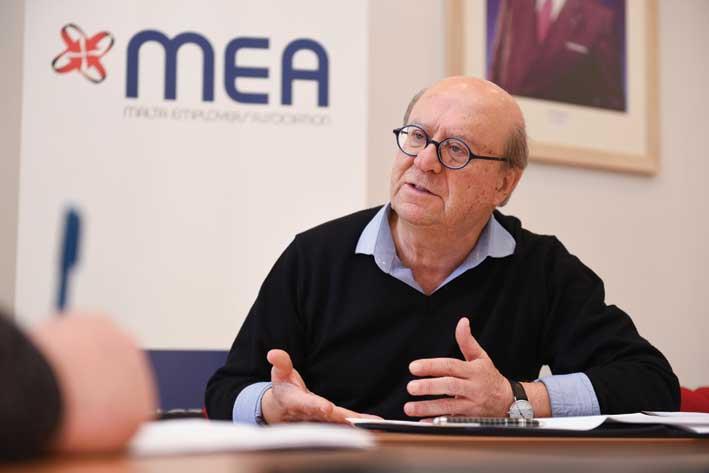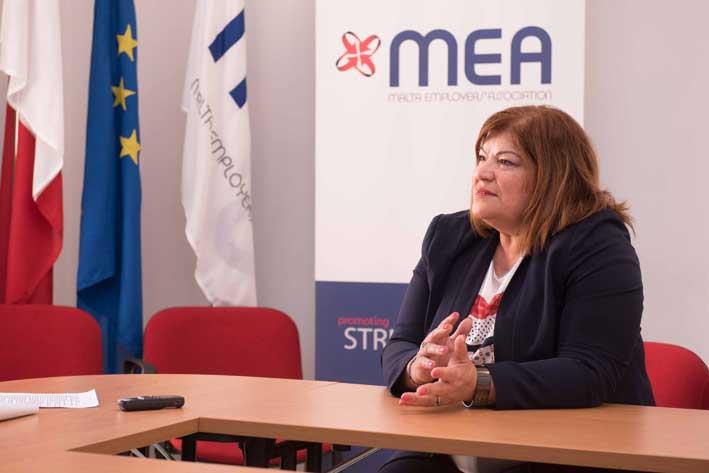Aside from being the MEA President, Doris Sammut Bonnici is an entrepreneur and is the Managing Director and co-proprietor of the Green Skip Services Ltd, and G.S.Rec. Ltd, dealing in industrial waste management. She previously served on the MEA council for a number of years, and was also Deputy President.
During the interview, she stressed that she believes that very few within the private sector employers can compete with what government can offer, and highlighted situations where companies are unable to expand due to lack of staff, local staff shortages , and situations where the work permits needed to employ foreigners just takes too long. It’s frustrating knowing that government is aware of the situation faced by the private sector, but still this is happening.”
She also said that it is currently an employee market, and highlighted the high turnover rate when it comes to employees shifting from one company to another, or to the public sector, resulting in situations where much time is consumed to recruit and retrain.
Will you be changing the Association’s stance on any issues?
Our positions, views, and recommendations go through the Council, and these are also the general view in terms of what we agree on when representing employers. Recently we also began applying apply serious survey techniques. Who knows, in future there might be issues where we need to change positions and opinions, but that is not entirely up to me, as everything is discussed at Council as well as within the Presidency team. We are there for the employers, and we have to make sure we reflect their needs.

What’s your position on raising the minimum wage?
My opinions are the same as in our position paper. There are very few people on the minimum wage, roughly 3,500. The worrying effect of raising the minimum wage is that when raising it, there will be an upward ripple effect, meaning that the next step of wages would want an increase and so on and so forth. In truth, would we really be solving the issue of getting people out of the poverty line? I believe that was the original objective. Education, and addressing problematic employability, on the other hand is.
If this happens, the whole exercise will be futile, as in the end, purchasing power would again reach a level where nothing would be gained. What will happen, is that employers would increase their product or service prices, and eventually this would lower purchasing power, resulting in everyone returning to where we left off in the first place.
Those in favour of a minimum wage rise could argue that such an increase in other wages are desirable as wages in Malta are low…
Of course, more wages sounds great….but one has to think where they come from, and would we still be competitive, to keep sales going, which in turn keep jobs in place? At the moment, the issue being discussed is rising rent prices, but along with this, wages have also gone up as people are being poached, going from company to company or to government, and we are faced with a situation where we are almost blackmailed by our own employees. As an example, employees might receive better offers from other companies, and they are asking employers to match it. The employers are with their backs against the wall, and would think twice in an effort to retain good employees.
It’s an ideal situation for employees, and I understand why and I don’t blame them. This happens, so I don’t agree that wages are low in Malta for our kind of standard of living. I believe middle-wages and up are doing ok, most people who have studied and prepared themselves for the world of work get well rewarded. When one compares, one has also to see other things, not just the wages.

Former MEA President Arthur Muscat said that one possible alternative for a minimum wage rise would be to introduce a system whereby persons employed on a minimum wage would receive an increase after one year.
Yes it is in our position paper, where we propose that there will be an increase in the second year, and again in the third year consecutively until they reach an established amount. However we fear that the whole objective of this debate, to pull people out of the poverty line, will not be reached by raising the minimum wage, as a €3 increase won’t make much of a difference. It would be much better for government to address this through a proper strategy, to which some efforts have already been done. But we need to go further as no matter how small a number they are, they are still important
We need persons who struggle academically to move towards learning trade skills, as people might be unsuccessful at one thing, but good at another. This can help lift struggling people out from their situation and they might increase their employability and self-esteem.
If we go for your proposal, raising the wage after one year but keeping the minimum wage as is, wouldn’t this create exactly the same problem situations you mentioned?
Eventually yes, but over a number of years and not instantly, so that will give some leeway for small and micro SME’s to prepare themselves. It may seem a small amount but a recurring constant one.

Do you believe there is a skills gap, and if yes, what do you believe needs to be done to address this issue?
Yes there is a skills gap. Even at my waste management company, we have to train our own as there is no specialised waste management training in Malta. We have to bring in our own tutors, and conduct our own training and offer it to people in the same field.
The fact that one does not find a particular training course hurts either our pockets or hurts because we are unable to expand in that area unless we bring in costly employees from another country. In today’s fast evolving business world trades change and production techniques develop, thus increasing the demand for employees for these specialised fields. We must establish more tuition to meet the growing demand in our industry.

What is the extent of employer frustration in not being able to find the right people to fill positions quickly?
It’s a daily concern. People would be going about their daily lives, be awarded a contract, and would suddenly need more staff that are ready to go within weeks. If one can’t find Maltese employees, the employer would end up waiting for months for the processing of work permits for foreigners.
Which sectors suffer most from this issue?
I believe it’s every sector, both low-skilled and high-skilled sectors. The lower-skilled sectors are being filled in by migrants, who are receiving training like any other Maltese employee, sometimes very specialised training. The higher skilled sectors have no choice but to line up and wait patiently for foreign recruits’ work permits.
The only jobs I can think of where one would probably receive a quick response, in terms of applications for a post, are office clerks and administration jobs.

Do you feel government is doing enough to address this, and what more can be done?
As regards to the skills gap, I believe that MCAST has begun to offer certain specialised courses. From the Employers side we need to highlight the missing skills so that the skills deficit can be addressed in education. These measures take time to form and develop, so the sooner we get this done the better. But then again if we do not have enough local people ready to learn, and be employed, we would then have to offer these posts to foreigners to fulfil the industries’ needs.
Public jobs are known to be the most secure form of employment. How can the private sector compete, and has government been employing too many people? Is it reaching crisis levels for the private sector?
The term known for this is ‘ahjar mal gvern ghax post sikur u tajjeb’ (Cushy job). The job where accountability is questionable, where there is a 100% job guarantee, where terminations unheard of, and where the coffers where the pay comes from are always full. The government had gone through a very long term exercise of minimising the public sector employees for the past years; a healthy economic measure as taxpayers would certainly agree. Now over the last months a sudden surge of recruitments….one wonders if it is to do with the energetic race to prepare Valletta for the 2018 or just simply, vote rigging, considering that the election is soon with us.
The private sector does offer good conditions, as in certain areas they exceed what the law requires, and of course to keep staff happy sometimes an employer would have to exceed their limit as it is worth giving a little more rather than having to replace and retrain new employees. But in the private sector there is a different work culture. It is not fair that, as an employer, the government can abuse the system and hires without applying the proper ethics and procedures as required by the law. This then puts the private sector in an unlevel playing field, and therefore could not compete. In today’s situation of lack of manpower, yes, this is starting to become a crisis

Within the Malta Council for Economic and Social Development (MCESD), is there a constant situation of employers’ associations facing off against unions?
No, we try to find a compromise, we discuss. Obviously they see things from the angle of employees, while we see things from the angle of employers, and we try to find a common path. When this happens it’s ideal.
Sometimes there are issues. In fact I was just discussing an issue with our German counterparts. In Germany, if the economy is strong, employees receive higher earnings, there’s a better standard of living etc. When the economy slumps, they also adjust, reducing salaries and their hours. They flow with the economy. On the contrary, have you ever heard of something like this being done in Malta? So if we raise wages, then God forbid there is a slump, what will happen? The economy moves in curves. What will happen if the economy slumps and yet product costs remain high? The poor will become poorer. Employers will be flattened through uncompetitive prices. In Malta we don’t flow with the economy, and what is increased in the case of favourable work conditions and wages, stays increased, which is worrying for the general economy when things are not going well.
Hypothetically, if Malta used this system, would Maltese employers really be willing to pay more?
They already are paying more due to market forces. Maybe not on all levels. but they are paying more, otherwise they can’t retain their staff.

What should government do help employers in the current situation?
Hands off our employees. We should also be aware of the real issues, the core of what is happening. Sometimes one needs to go down to the level of every company and see the real needs of businesses. That is precisely what MEA is doing. Governments should respect social dialogue and listen to and consider the representatives of the motor, and the movers of the economy.
Do you think we can keep this upward economic trend, or do you think we are reaching a peak?
I’d like to think we are still further from reaching a peak and can still go further if we are careful. We have to ensure that we are not victims of our own success. This issue of employees is causing a lot of unnecessary hassle, and stress. If we address the issue of the unemployed, and train them, while furthering training persons on low-level jobs, we can do even better. But we also expect some help from government on the urgent issue regarding the lack of potential employees. We need them as fast as possible, otherwise businesses cannot diversify and expand.
Employees are today considered a company’s most valuable asset. Government can help by speeding up the process of permits for foreigners. All sorts of problems come about when it comes to high-level employment, such as accountants or architects. If you need an architect, you don’t need him or her next year, but now. If you need a project manager, you need them urgently. Usually when a tender is awarded, one would need to start in three - four weeks.